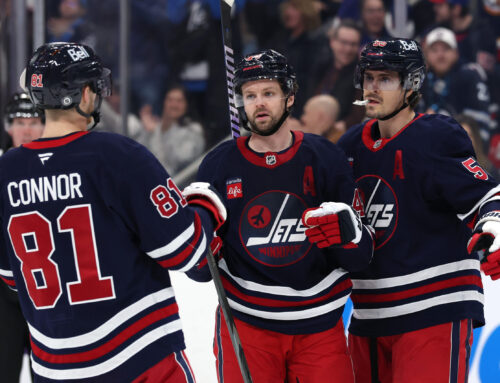
So what do the NHL playoffs have to do with jelly beans? In truth, not much, but more on that in a second. At this time of year we are bombarded with everyone’s playoff takes on who should win and why, and the “X Factor” that all but guarantees it. For the most part though, only a few of the theories are based on something more than feeling. This article is going to summarize a few more data driven or evidence-based theories and kick off a mini-series where we compare their predictions in the Western Conference this year. The theories are as follows:
Expert Panel
Back to jelly beans. Imagine you and your friends are at a county fair and in front of you is one of those big bowls of jelly beans. There is a prize for the guess that is closest, but your group can only guess once. How do you do it? Talk it out? Everyone guess by themselves? It turns out there is some research on this phenomenon in behavioral economics (if someone can provide a reference in the comments I would greatly appreciate it). The idea is that if the group were to talk, the guess would be closer to what the person who speaks first and loudest suggests rather than what the actual group thinks. The better plan would be to have everyone guess individually and then average the guesses.
Great. What does that have to do with the playoffs? Well we recently released predictions from the Dobber Expert Panel. Take a look here. A great thing about the article is that it listed the “Consensus Picks” which essentially acts like averaging the jelly beans in the story above. It was done blindly, with everyone creating their picks independently of each other, so theoretically should be a better predictor than our individual opinions.
Goal Differential
Back on a March 27 Rambling, Steve Laidlaw shared some work he had done on playoff success and provided some more rationale as to why goal differential is the most important detail to look at when trying to predict playoff success. The general gist being that there are lots of strategies or skills a team can use to outscore their opponent, but the best predictor of playoff success is that they are consistently able to do so. In the case of Nashville v. Colorado, Nashville's regular season goal differential of 57 suggests they would prevail over Colorado’s 19.
Matchup Specific Chance and Goal Differential
My apologies to Travis Yost, but I had to call it something and the article didn’t really give it a pithy name. Over on TSN, Yost wrote a great piece outlining how he uses head to head matchups during the regular season to find out which teams out-chanced and outscored their opponents. The general theory being that analyzing chances gives you a larger data sample than just goals. If your team has been consistently out-chanced by their playoff opponent during the regular season, it's likely the opponent will in the playoffs too.
‘Expert’ Analysis
Just for comparison, a control, if you will, I have included the predictions I made for the expert panel.
Round One Predictions
Using the models described above, I have included all of the predictions for the round one matchups and what the model would predict for conference champion.
Note: All of this data was gathered before any playoffs games were played.
|
|
Panel |
Goal Differential |
Matchup Chance Diff. |
‘Expert’ |
|
Nashville v. Colorado |
Nashville |
Nashville |
Nashville |
Nashville |
|
Winnipeg v. Minnesota |
Winnipeg |
Winnipeg |
Winnipeg |
Winnipeg |
|
Vegas v. LA |
LA |
Vegas |
Vegas |
Vegas
📢 advertisement:
|
|
Anaheim v. San Jose |
San Jose |
Anaheim* |
San Jose |
San Jose |
*differential was essentially tied (22 – 21 Anaheim)
|
Conference Champion |
Nashville |
Nashville/ Winnipeg* |
Winnipeg |
Winnipeg |
*differential was exactly tied (57)
There is actually a lot of agreement across the board here, for round one anyway. None of the models predict good things for Minnesota or Colorado. But hey, it’s the playoffs, anything can happen! I will check in again at the end of round one to compare results and check predictions for round two.
Quick Hits: Playoff Action
There has yet to be the massive scoring surge that we have seen in the East over here on the West Coast, but that doesn’t mean there aren’t some players worthy of your attention.
Nashville (2) v Avalanche (0): It has only been two games, but Nashville has been scoring by committee here with eight players gathering two or more points. Filip Forsberg and Kevin Fiala though are the only ones who have averaged three or more shots in the two games though, so it is hard to imagine Colton Sissons and Austin Watson keeping pace over the length of the postseason.
Winnipeg (2) v Minnesota (1): Patrik Laine leads way for Winnipeg with two goals two assists and 11 shots over three games. His shooting percentage may seem high at about 18.2, but his regular season percentage this year was 18.3 so he is looking to be right on track so far.
Vegas (3) v LA (0): If I told you that Vegas was up 3-0 in this series you might assume it is because their goalie has a goals against average (GAA) of 1.13, a save percentage (SV%) of .940 and two quality starts in those three games. Unfortunately those are Jonathan Quick’s numbers and he has lost all three. Marc-Andre Fleury has represented Vegas very well and has a 0.56 GAA, a .974 SV% and three quality starts. Oh, and of course three wins.
San Jose (2) v Anaheim (0): Again it has only been two games, but San Jose players have been throwing some serious shots on goal. Tomas Hertl (10), Evander Kane (13), and Brent Burns (10) are averaging five-plus shots per game thus far.
Leave thoughts or suggestions in the comments section.
![]()
Recent Wild West Articles:
Western Conference: Sneaky Playoff Pool Value Picks





 EDM
EDM STL
STL ANA
ANA BUF
BUF DET
DET NYI
NYI CAR
CAR MIN
MIN PIT
PIT VGK
VGK
